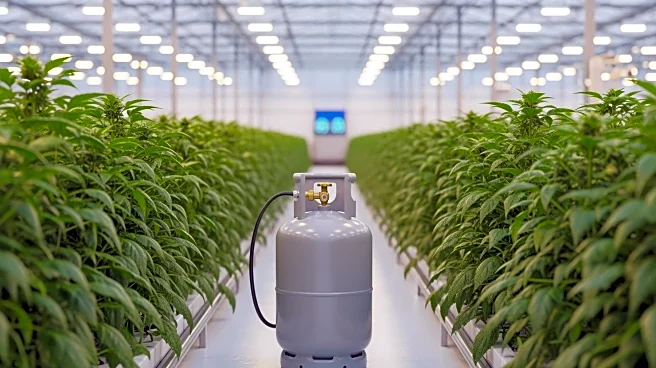What's Happening?
Wildhorse Propane & Appliance is emphasizing the critical role of propane in greenhouse and vertical farming, highlighting its efficiency in controlling growing environments. Propane is presented as a clean
fuel that supports sustainable indoor farming by providing reliable temperature control, cost-effective operations, and reduced greenhouse gas emissions. The company has been serving agricultural communities in California since 1980, and it continues to support innovations in farming practices. Vertical farming, which uses significantly less water and land compared to traditional methods, is gaining traction as a solution to challenges such as loss of farmland and environmental changes. Propane is seen as a vital component in this shift, offering backup power and stable pricing compared to other energy sources.
Why It's Important?
The use of propane in indoor farming is significant as it addresses several challenges faced by modern agriculture, including the loss of farmland and the need for sustainable practices. California, a leading agricultural producer, is losing agricultural land annually, which impacts food supply. Innovations like vertical farming, supported by propane, offer a way to increase crop yields using less land and resources. This shift is crucial for small farms, which play an important role in local food economies. Propane's efficiency and lower emissions make it an attractive option for farmers looking to adopt more sustainable practices. The successful turnaround of vertical farming companies like AeroFarms indicates a promising future for these methods, with propane playing a key role.
What's Next?
As the demand for sustainable farming solutions grows, the role of propane in supporting these innovations is likely to expand. Wildhorse Propane & Appliance is poised to continue its support for local farms and agricultural innovations in California. The Propane Education & Research Council (PERC) sees propane as critical to the future of vertical farming, suggesting further integration of this fuel in agricultural practices. Farmers may increasingly convert portions of their operations to greenhouse or vertical farming to enhance yields and efficiency. The ongoing loss of farmland will continue to drive the need for innovative solutions, with propane providing a reliable energy source for these advancements.
Beyond the Headlines
The shift towards indoor farming and the use of propane has broader implications for environmental sustainability and energy efficiency in agriculture. By reducing reliance on pesticides and conserving water, these practices contribute to a more sustainable food supply chain. The adoption of propane in farming also reflects a move towards cleaner energy sources, aligning with broader environmental goals. As urbanization continues to encroach on agricultural land, indoor farming supported by propane offers a viable solution to meet food demands without expanding land use. This transition may also influence policy decisions related to energy and agriculture, promoting further investment in sustainable technologies.








